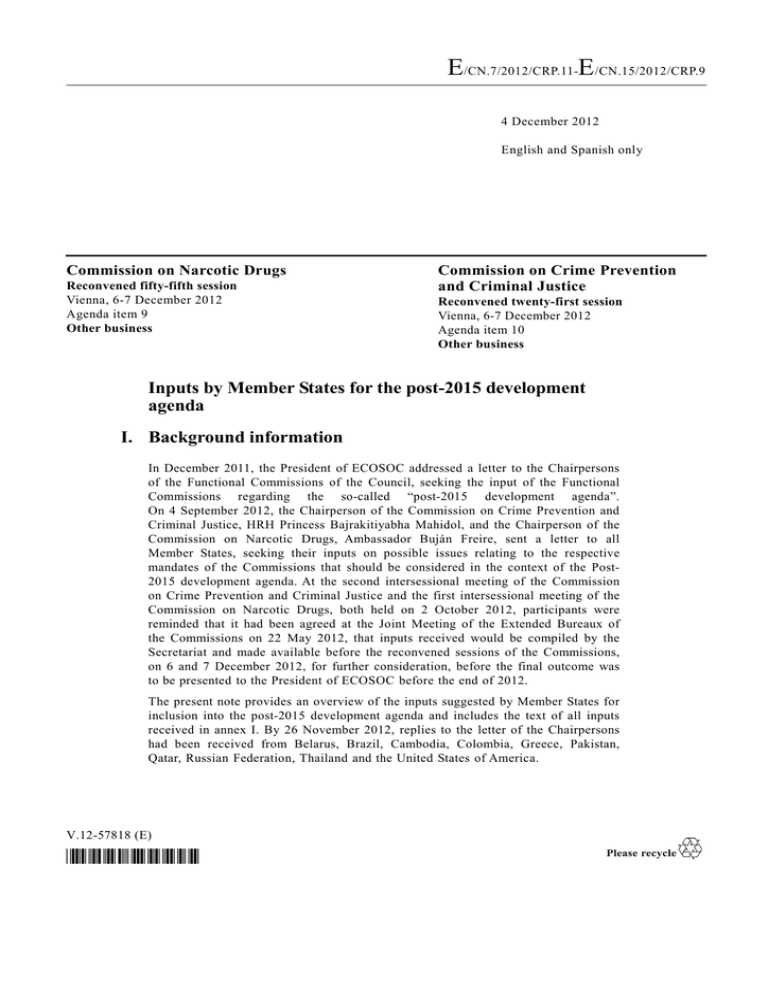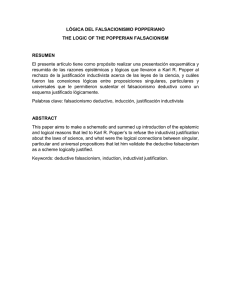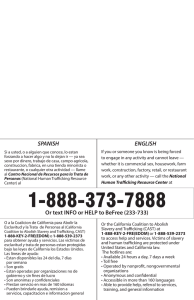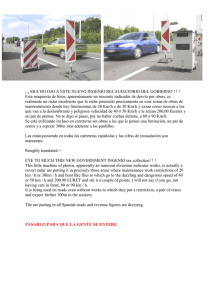Inputs by Member States for the post
Anuncio

E/CN.7/2012/CRP.11-E/CN.15/2012/CRP.9 4 December 2012 English and Spanish only Commission on Narcotic Drugs Reconvened fifty-fifth session Vienna, 6-7 December 2012 Agenda item 9 Other business Commission on Crime Prevention and Criminal Justice Reconvened twenty-first session Vienna, 6-7 December 2012 Agenda item 10 Other business Inputs by Member States for the post-2015 development agenda I. Background information In December 2011, the President of ECOSOC addressed a letter to the Chairpersons of the Functional Commissions of the Council, seeking the input of the Functional Commissions regarding the so-called “post-2015 development agenda”. On 4 September 2012, the Chairperson of the Commission on Crime Prevention and Criminal Justice, HRH Princess Bajrakitiyabha Mahidol, and the Chairperson of the Commission on Narcotic Drugs, Ambassador Buján Freire, sent a letter to all Member States, seeking their inputs on possible issues relating to the respective mandates of the Commissions that should be considered in the context of the Post2015 development agenda. At the second intersessional meeting of the Commission on Crime Prevention and Criminal Justice and the first intersessional meeting of the Commission on Narcotic Drugs, both held on 2 October 2012, participants were reminded that it had been agreed at the Joint Meeting of the Extended Bureaux of the Commissions on 22 May 2012, that inputs received would be compiled by the Secretariat and made available before the reconvened sessions of the Commissions, on 6 and 7 December 2012, for further consideration, before the final outcome was to be presented to the President of ECOSOC before the end of 2012. The present note provides an overview of the inputs suggested by Member States for inclusion into the post-2015 development agenda and includes the text of all inputs received in annex I. By 26 November 2012, replies to the letter of the Chairpersons had been received from Belarus, Brazil, Cambodia, Colombia, Greece, Pakistan, Qatar, Russian Federation, Thailand and the United States of America. V.12-57818 (E) *1257818* E/CN.7/2012/CRP.11 E/CN.15/2012/CRP.9 II. Overview of inputs Member States stressed the need to consider the linkages between development and justice, security and the rule of law in the context of the review of the Millennium Development Goals and the elaboration of the post-2015 development agenda. On the one hand, poverty, inequalities, lack of education, high population growth, rapid urbanization, social exclusion and marginalization were considered as root causes for crime. Vulnerable groups, especially women and children, were most at risk of violence and victimization. On the other hand, crime-related violence, transnational organized crime, including trafficking in persons and smuggling of migrants, as well as drug trafficking not only caused losses in terms of human resources and future productivity, but also negatively affected the enabling environment for the realization of development goals, the rule of law, business and finance and human security. The role of crime prevention and criminal justice in the post-2015 development agenda The inputs of Member States reflect the understanding that crime prevention and criminal justice efforts could play a significant role in strengthening the rule of law and achieving social, economic and environmental development. Global crime prevention and criminal justice issues, suggested by several Member States for consideration in the context of the post-2015 development agenda, included measures to prevent and address transnational organized crime, especially trafficking in persons, corruption and other forms of crime, including youth crime. The contribution of crime prevention and law enforcement to social integration and social inclusion, as well as their relationship with broader socio-economic policies were also considered important. It was stressed that corruption and other forms of economic crime hamper development by depriving economic actors of resources that are vital for poverty eradication. Weak justice institutions could render societies susceptible to transnational organized crime and drug trafficking, especially in fragile and postconflict States where the consequences of violence on development are significant. It was suggested that due consideration should be given to the impact of economic crime on development and that anti-corruption measures should be mainstreamed into judicial sector reform programming. Access to justice and the rule of law were also suggested for consideration in the post-2015 development agenda. Member States emphasized ways to strengthen justice sector reform, including capacity building, especially in post-conflict and transitional contexts. The United Nations standards and norms in crime prevention and criminal justice played an important role in support of effective, fair, humane and accountable criminal justice systems. Member States further referred to issues related to security and the prevention of interpersonal violence in the context the post-2015 development agenda. Trafficking in persons and smuggling of migrants had significant impacts on sustainable development. Violence against women and children were equally serious issues and crime prevention and criminal justice measures contributed to their prevention and elimination. Member States stressed the importance of preventing urban crime and 2 V.12-57818 E/CN.7/2012/CRP.11 E/CN.15/2012/CRP.9 promoting the safety of cities, action against criminal threats to tourism and measures to combat cybercrime, as well as strategies to combat environmental crime to achieve sustainability and action against smuggling in precious metals. The importance of public-private partnerships in the fight against crime was also emphasized. The role of measures to counter the world drug problem in the post-2015 development agenda The inputs of Member States reflect the understanding that the world drug problem has an impact on economic growth and development. It was stressed that the mandates of the Commission on Narcotic Drugs were closely related to the existing Millennium Development Goals on poverty eradication, gender equality and combating HIV/AIDS, malaria and other diseases. Member States underlined that measures to counter the world drug problem, including prevention, demand control, rehabilitation, supply control and drug trafficking, should be further discussed within the existing multilateral framework. Adopting a gender perspective was crucial in this regard, since drug policies that take into account gender considerations could contribute to achieving gender equality. With regard to demand reduction and related measures, the importance of respect for human rights, including the right to health was stressed. Relevant policies needed to facilitate social inclusion and should be based on a multidimensional approach to development. It was suggested that related issues, including drug use and access to drug treatment services, could become part of a broader development goal on public health. The incidence of HIV/AIDS and other blood-borne diseases among injecting drug users was stressed in the context of Millennium Development Goal 6 on combating HIV/AIDS, malaria and other diseases. With regard to supply reduction, the important contribution of alternative development measures to the eradication of poverty and the achievement of environmental sustainability was highlighted. Member States supported the consideration of alternative development in the context the post-2015 development agenda, either as an additional development goal or in the context of existing targets on poverty reduction. Further specific concerns included the importance of countering the diversion of precursors for drug production, the problem of synthetic drugs, and assistance to counter the production and trafficking of drugs originating from Afghanistan, including through the Paris Pact Initiative. With regard to countering money-laundering and promoting judicial cooperation to enhance international cooperation against the world drug problem, action against the legalization of financial flows from drug trafficking was considered important. The role of the functional Commissions in the process towards a post-2015 development agenda Member States stressed the need for a comprehensive approach and supported further involvement of the Commission on Narcotic Drugs and the Commission on Crime Prevention and Criminal Justice in the discussions leading to the establishment of the post-2015 development agenda, in close coordination with ECOSOC and other United Nations bodies and entities. V.12-57818 3 E/CN.7/2012/CRP.11 E/CN.15/2012/CRP.9 The 13th United Nations Congress on Crime Prevention and Criminal Justice to be held in Qatar in 2015 was mentioned as an important opportunity to mainstream crime and justice issues into this process. Reference was made to the main theme of the 13th Crime Congress: “Integrating crime prevention and criminal justice into the wider United Nations agenda to address social and economic challenges and to promote the rule of law at the national and international levels, and public participation”. 4 V.12-57818 E/CN.7/2012/CRP.11 E/CN.15/2012/CRP.9 Annex Contributions as submitted by Member States Belarus Following the United Nations Conference on Sustainable Development "Rio+20” outcomes we consider sustainable development at all levels as a mainstream for the post-2015 development agenda. Under the priority areas for the ensuring of sustainable development we would suggest to accent, inter alia, such streamlines as transnational organized crime, illicit trafficking and illicit drug trafficking counteraction as well as anticorruption. CCPCJ and CND should continue their efforts in assisting the Member States to prevent these threats through improving the national capacity and developing effective strategies of criminal justice. It is highly important to continue the revision and improvement of existing international standards and norms as well as to keep on researches and trend analysis to prevent the existing and new forms of transnational organized crime (cybercrime, human trafficking for purpose of organs removal, child pornography). The problem of human trafficking elimination should be widely reflected in the CCPCJ agenda beyond 2015. We should consider this activity as one of the principle tasks of transnational organized crime counteracting. The complex character of the threat requires a global action to counter human trafficking in its all forms and manifestations. The UN Global Plan of Action to Combat Trafficking in Persons adopted by the 64th session of the United Nations General Assembly has become a real mechanism to ensure coordination and cooperation of all anti-trafficking actors, including the United Nations, Governments and civil society organizations. A crucial achievement of the Global Plan is the Voluntary Trust Fund for Victims of Human Trafficking, created under the aegis of the UNODC, and designed to provide humanitarian, legal and financial aid to victims of human trafficking across the world. We should encourage the governments, intergovernmental organizations, private-sector and civil society to continue providing financial support to the Fund. Active involvement of the Inter-Agency Coordination Group against Trafficking in Persons in improving coordination and cooperation among relevant UN entities and international organizations should benefit the effective Global Plan implementation in post-2015 activity to fight trafficking in persons. The potential of the entities and agencies of the UN system should be actively used to efficiently fight trafficking in persons at the global level beyond the 2015, including through implementation of the Global plan of Action and other international documents on human trafficking. Our goal is to create a sustainable mechanism transforming the cooperation and coordination among all stakeholders into a steady and long-term element of the global fight against human-trafficking. We believe that the issue of Global plan V.12-57818 5 E/CN.7/2012/CRP.11 E/CN.15/2012/CRP.9 implementation should contribute to the post-2015 development agenda aimed to create a comprehensive vision of further steps to achieve development goals. Brazil Brazil sees with satisfaction the understanding, within the Commission on Crime Prevention and Criminal Justice (CCPCJ), of the need to address the links between development and public safety. In this sense, Brazil has been engaged in initiatives such as the establishment of an academic centre, linked to the United Nations, for the purpose of promoting studies on public security policies, from a multidisciplinary perspective, with emphasis on its relation to social development. Bearing in mind the ongoing debates within the United Nations on transnational organized crime, a research centre dedicated to this field of work could produce knowledge that would give scientific support to multilateral negotiations on the matter. From the Brazilian perspective, public security policies must involve both prevention and law enforcement aspects, with due attention to social inclusion. The improvement in development levels in association with combating poverty and social inequality, as well as the adoption of public policies in the areas of education and health, contribute to the strengthening of security. Public security must also be addressed from the human rights perspective. In this sense, Brazil has followed with interest the discussions, in the framework of the CCPCJ, on the revision of the Standard Minimum Rules for the Treatment of Prisoners. Brazil is of the view that these Rules, which date back to 1955, need to incorporate technical and regulatory developments as well as other multilateral consensus. It is understood that the review of the Millennium Development Goals (MDGs) must take into consideration the linkages between public security and development. In this regard, the Brazilian Government has made efforts to see reflected, on the MDGs review, the progress achieved by the country through the development of public security policies aimed towards social inclusion and development. In what concerns the world drug problem, Brazil believes that issues related to prevention, demand control, rehabilitation, supply control and drug trafficking must be discussed together with other governments and within the framework of international organizations. Regarding rehabilitation policies, one cannot neglect relevant components such as the respect of human rights and social inclusion. Cambodia Drugs has been posing serious problems to people’s health, social security and order and seriously effecting the development of community and society as the whole. Referring to the World Drug Report 2010 and 2011, production and use of drugs, especially synthetic drugs Amphetamine-Type Stimulant, has no sight of declination but seems to increase in some countries, particularly the countries in Asian Region. Based on past experiences and lesson learns, combating drugs is one of prioritized activities that needs times and continuous implementation to ensure that 6 V.12-57818 E/CN.7/2012/CRP.11 E/CN.15/2012/CRP.9 development of society can smoothly move forward. In order to have a comprehensive and effective post-2015 development agenda, all related problems and challenges including drugs should be reviewed and take into action. Problems • Drug is a global problem which no one country can totally and sustainably eradicate. • Drug problem has been posed by criminal syndicate who has strong structure and based in almost all countries over the world. • Criminals continue to use all aspect of tact in order to produce and traffic drugs from one place to another, from one country and a region to another and to facilitate the processes of drug production and trafficking, the criminals use all possible measures that can also seriously effect to social security and order as well as creating a number of problems in the government. • The number of drug user and addict has been increasing from year to year, while treatment measures seem to have limited effectiveness and very costly. Comments Based on evolution of the past and current drug situation at country, regional, as well as global level and based on past experiences and lesson learns, we should predict or assess on how drug situation can be after 2015? For instance, the increase of diversion of precursor chemical from legal to illegal use, the use of medicines containing addictive substances to produce illegal drugs, etc., and the high demand of labour in some countries. By basing on the result of such a prediction or assessment, post2015 should be linked to all measures that need to deal with drug related problems: 1. Prevent and counter drug production and trafficking: which need to consider on strengthening mechanisms, capacity and materials at country, regional, and global level in order to prevent and counter the attempt of illegal drug production, processing, and trafficking as well as preventing and countering the diversion of precursor chemical and other psycho active substances. 2. Prevent the abuse of drug and saving drug addict: shall continue to provide facilitation and support to all awareness raising measures and continue to strengthen and promote measures that help people who are addicted to drugs through scientific and evidence based treatment and other health and social related services. At the same time, research and study should also be facilitated, promoted, and supported to ensure the effectiveness of approaches to prevent drug abuse, especially to ensure the effectiveness of treatment and harm reduction services. 3. Heightening cooperation and strengthening the sharing of information and experiences: continue and strengthen mechanism bilaterally and multilaterally such as regional mechanism to ensure the cooperation and sharing of information in term of both areas of drug supply and demand reduction. V.12-57818 7 E/CN.7/2012/CRP.11 E/CN.15/2012/CRP.9 Colombia Colombia encuentra puntos de convergencia entre los mandatos emanados de la Comisión de Estupefacientes y tres de los Objetivos de Desarrollo del Milenio: erradicar la pobreza y el hambre, equidad de género y combatir el VIH/SIDA, el paludismo y otras enfermedades. En este entendido, Colombia considera que a la luz de los mandatos emanados de la Comisión de Estupefacientes, los siguientes serían temas que podrían considerarse en la construcción de la agenda de desarrollo post 2015 y sobre los cuales la Comisión podría hacer seguimiento: 1. Desarrollo Alternativo, en el contexto de la reducción de la pobreza El Desarrollo Alternativo, como una estrategia para proveer de alternativas económicas viables las zonas afectadas por cultivos ilícitos, se encarga de abordar factores de riesgo, como la pobreza y la falta de presencia estatal que actúan como un incentivo al surgimiento de actividades ilícitas que distorsionan las economías lícitas y promueven la inequidad y la pobreza. Resaltando la importancia de promover el desarrollo rural, la Convención de las Naciones Unidas contra el Tráfico Ilícito de Estupefacientes de 1988, en su artículo 14, numeral 3, literal a, establece: “Las Partes podrán cooperar para aumentar la eficacia de los esfuerzos de erradicación. Tal cooperación podrá comprender, entre otras cosas, el apoyo, cuando proceda, al desarrollo rural integrado tendiente a ofrecer soluciones sustitutivas del cultivo ilícito que sean económicamente viables. Factores como el acceso a los mercados, la disponibilidad de recursos y las condiciones socioeconómicas imperantes deberán ser tomados en cuenta antes de que estos programas hayan sido puestos en marcha. (…)”1 Lo contenido en este instrumento, reconoce que uno de los elementos que deben ser tenidos en cuenta ante la existencia de cultivos ilícitos, es la promoción de iniciativas de reducción de la pobreza, considerando esta última, como un factor de riesgo para el aumento de la oferta ilícita de drogas de origen natural. En este mismo sentido, la Comisión de Estupefacientes ha reconocido en diversas ocasiones la importancia de la promoción del Desarrollo Alternativo y de la integralidad y sostenibilidad de los proyectos en este ámbito. La Declaración Política y Plan de Acción sobre un Enfoque Integral y Equilibrado para enfrentar el Problema Mundial de las Drogas, en su aparte de Reducción de la Oferta de Drogas, dedica varias de las acciones al enfrentamiento de la pobreza como factor de riesgo para el surgimiento de cultivos ilícitos. Por último, la Comisión de Estupefacientes de las Naciones Unidas, ha aprobado diferentes resoluciones sobre la materia, entre otras: • Resolución 55/8 Seguimiento del Plan de Acción sobre cooperación internacional en favor de una estrategia integral y equilibrada para contrarrestar el problema mundial de las drogas en lo que respecta a la __________________ 1 8 Convención de las Naciones Unidas Contra el Tráfico Ilícito de Estupefacientes de 1988. V.12-57818 E/CN.7/2012/CRP.11 E/CN.15/2012/CRP.9 elaboración de estrategias sobre regímenes de comercialización especiales para el desarrollo alternativo, incluido el desarrollo alternativo preventivo. • Resolución 54/5 Promoción de estrategias orientadas a la rehabilitación y la reintegración en respuesta a los trastornos relacionados con el uso indebido de drogas y sus consecuencias y dirigidas a promover la salud y el bienestar social a nivel individual, familiar y comunitario. • Resolución 53/6 Seguimiento de la labor de promoción de las mejores prácticas y de la experiencia adquirida para fortalecer la sostenibilidad y el carácter integral de los programas de desarrollo alternativo, así como de la propuesta de organizar un curso práctico y una conferencia internacionales sobre el desarrollo alternativo. • Resolución 52/6 Promoción de las mejores prácticas y de la experiencia adquirida para fortalecer la sostenibilidad y el carácter integral de los programas de desarrollo alternativo. De esto que teniendo en cuenta que el Desarrollo Alternativo, como una estrategia de reducción de cultivos ilícitos, contribuye a la reducción de la pobreza y la promoción de la sostenibilidad ambiental, deberían promoverse, las discusiones técnicas en la materia y la aplicación de estas políticas con el fin de que se garantice el cumplimiento del objetivo que busca enfrentar factores de riesgo como la pobreza, los efectos adversos del Problema Mundial de las Drogas sobre el medio ambiente y lograr la reducción de los cultivos ilícitos. 2. Perspectiva de género en las políticas sobre drogas La Comisión de Estupefacientes en el marco del Plan de Acción de 2009, ha reconocido la importancia de velar por el respeto de un enfoque de equidad de género en la formulación de políticas para enfrentar el Problema Mundial de las Drogas. Si bien el mismo no dedica un aparte específico al desarrollo de este tipo de medidas, reconoce tanto en el campo de la reducción de la demanda como en la aplicación de medidas de desarrollo alternativo, la importancia de contar con una perspectiva de género que permita tener un enfoque inclusivo de las políticas y/o programas. Adicionalmente, con respecto a la reducción de la demanda de drogas, en el marco del 55 Periodo de Sesiones de la Comisión de Estupefacientes, se aprobó la Resolución 55/5 “Fomento de estrategias y medidas que respondan a las necesidades específicas de la mujer en el contexto de programas y estrategias amplios e integrales de reducción de la demanda de drogas”. El mandato contenido en la Resolución 55/5 aborda diferentes elementos como el acceso a programas de salud, oportunidades laborales y educativas como medidas de prevención y tratamiento del uso indebido de drogas. Tal como se resalta en el preámbulo de la precitada Resolución, se toman en cuenta los compromisos internacionales adquiridos en la Declaración del Milenio y en la Plataforma de Acción de Beijing adoptada en la Cuarta Conferencia Mundial sobre la Mujer de 1995. Lo anterior, con el fin de que todas las políticas se enfoquen con una perspectiva inclusiva y de atención a grupos vulnerables. V.12-57818 9 E/CN.7/2012/CRP.11 E/CN.15/2012/CRP.9 De allí que, asumiendo una interpretación amplia de equidad en los términos que puede ser entendida en lo discutido por el Comité de Naciones Unidas sobre Política de Desarrollo, la perspectiva de género en las políticas para enfrentar el Problema Mundial de las Drogas sería un esfuerzo importante para la promoción de la equidad. Por lo tanto, desde los mandatos emanados de la Comisión de Estupefacientes, debería promoverse que se continúe implementando la visión de género en los lineamientos políticos que se aprueben en el marco de este escenario. 3. Combatir el VIH/SIDA, el paludismo y otras enfermedades La Organización Mundial de la Salud ha identificado como uno de los principales mecanismos de transmisibilidad del VIH/SIDA, el uso de drogas intravenosas. Esto debido a las particularidades asociadas al mismo, tales como la compartición de jeringas, de algodones, entre otros. En este sentido, durante el Segmento de Alto Nivel del 52 Periodo de Sesiones de la Comisión de Estupefacientes de las Naciones Unidas, en el marco del Plan de Acción de 2009, los Estados manifestaron su preocupación con respecto al mencionado asunto, de la siguiente forma: “Observamos con gran preocupación las consecuencias negativas del uso indebido de drogas para las personas y la sociedad en general, reafirmamos nuestro compromiso de abordar esos problemas en el contexto de estrategias amplias, complementarias y multisectoriales de reducción de la demanda de drogas, en particular las estrategias destinadas a la juventud, observamos también con gran preocupación el alarmante incremento de la incidencia del VIH/SIDA y otras enfermedades de transmisión sanguínea entre los consumidores de drogas por inyección, reafirmamos nuestro compromiso de esforzarnos por alcanzar el objetivo del acceso universal a programas amplios de prevención del uso indebido de drogas y a los servicios de tratamiento, atención y apoyo conexos, en pleno cumplimiento de las disposiciones de los tratados de fiscalización internacional de drogas y de conformidad con la legislación nacional, teniendo en cuenta todas las resoluciones pertinentes de la Asamblea General y, cuando proceda, la guía técnica de la OMS, la UNODC y el ONUSIDA, y pedimos a la Oficina de las Naciones Unidas contra la Droga y el Delito que cumpla su mandato en esta esfera en estrecha colaboración con las organizaciones y programas pertinentes del sistema de las Naciones Unidas, como la Organización Mundial de la Salud, el Programa de las Naciones Unidas para el Desarrollo y el Programa Conjunto de las Naciones Unidas sobre el VIH/SIDA;” Este asunto representaba la materialización de las preocupaciones manifestadas durante el proceso preparatorio del Segmento de Alto Nivel, el cual estuvo precedido por la aprobación, en el 51 Periodo de Sesiones de la Comisión de Estupefacientes de la Resolución 51/14 Promoción de la coordinación y armonización de las decisiones entre la Comisión de Estupefacientes y la Junta de Coordinación del Programa Conjunto de las Naciones Unidas sobre el VIH/SIDA. Posteriormente y en desarrollo de esta materia, las siguientes sesiones de la Comisión han aprobado, entre otras, las siguientes resoluciones sobre el tema que nos ocupa: 10 V.12-57818 E/CN.7/2012/CRP.11 E/CN.15/2012/CRP.9 • Resolución 54/13 Reducir a cero las nuevas infecciones por el VIH entre los consumidores de drogas por inyección y otros toxicómanos • Resolución 53/9 Acceso universal a servicios de prevención, tratamiento, atención y apoyo para los consumidores de drogas y las personas que viven con el VIH o que se ven afectadas por él. Si bien no se encuentra un reto específico relacionado con VIH y otras enfermedades en lo manifestado por el Comité sobre Política de Desarrollo, si se específica que las metas deben considerar una “visión multidimensional del progreso centrada en el ser humano” y por lo tanto incluiría la necesidad de implementar políticas que velen por la garantía del derecho a la salud. En este entendido, las políticas sobre drogas deberían profundizar su componente relacionado con la salud pública con el fin de avanzar en una perspectiva multidimensional de desarrollo. Greece Greece, in view of the implementation of a national Action Plan against Corruption from 2013 onwards which will consist of harmonization of the national legislation with the recommendations of the relevant: international treaties, the launching of coordinated initiatives and actions against corruption in a political and judicial level, and the promotion of the implementation of the national legislation against corruption as a political priority, wishes to propose that the issue of the fight against corruption be included in the post-2015 development agenda. Pakistan The Commission guides the activities of the United Nations in the field of crime prevention and criminal justice. It also reviews United Nations standards and norms in this area, including their use and application by Member States. The Commission’s mandates and priorities, include international action to combat national and transnational crime, including organized crime, economic crime and money laundering; promoting the role of criminal law in protecting the environment; crime prevention in urban areas, including juvenile crime and violence; and improving the efficiency and fairness of criminal justice administration systems. Saving our Generations: Preventing Youth and Children from Crime Conceptual Framework One of the core mandates of the Commission on Crime Prevention an Criminal Justice (CCPCJ) is to guide the activities of the UN in the field of crime prevention according to the Guidelines for the Prevention of Crime, Economic and Social Council resolution 2002/13, “Crime Prevention comprises strategies and measures that seek to reduce the risk of crimes occurring, and their potential harmful effects on individuals and society, including fear of crime, by intervening to influence their multiple causes.” According to the same guidelines, the above concept includes a wide range of approaches, including those that remote the well-being of people and encourage pro-social behaviour through social, economic, health and educational V.12-57818 11 E/CN.7/2012/CRP.11 E/CN.15/2012/CRP.9 measures, with a particular emphasis on children and youth, and focus on the risk and protective factors associated with crime and victimization (prevention through social development or social crime prevention). One of the basic principles for crime prevention calls upon the States to integrate crime prevention considerations into all relevant social and economic policies and programmes, including those addressing employment, education, health, housing and urban planning, poverty, social marginalization and exclusion. In this regard, particular emphasis should be placed on communities, families, children and youth at risk. Children form a basic component of our families and societies. At present there are around 2.2 billion children in the world. Around 90 per cent of these live in the developing countries. Despite efforts being made by the International Community, children still remain one of the most vulnerable segments of our societies. Besides the challenges being faced by children in terms of such aspects such as extreme poverty and hunger, a major threat being faced by the children include their victimization through crime. Not only this, but also that in many instances, children and youth are pushed into a situation whereby they are forced to commit crimes as well. The eight goals along with the specific targets under them by Millennium Development Goals have addressed such challenges being faced by children as extreme poverty, hunger, child mortality and lack of education. However, there is a growing need for a concerted action against the growing trend of crimes against children. This aspect involves two dimensions. On one side, children are the direct victims of crime and on the other second they are indirect victims as they are being forced to commit crimes themselves (forced criminality). These dimensions require an approach through which children could be prevented from being victims, in one way or the other, of Crime. The Convention on the Rights of the Child (20 November 1989), is the basic international legal instruments that recognizes and defines the rights of the children, one of which includes their protection from physical and mental violence. Gravity of the problem • Children are exposed to such risks as forced labour, child trafficking, drug abuse and their forced employment in commission of crime. • According to the International Labour Organization (ILO), today, throughout the world, around 215 million children work, many full-time. They do not go to school and have little or no time to play. Many do not receive proper nutrition care. They are denied the chance to be children. More than half of them are exposed to the worst forms of child labour such as work in hazardous environments slave or other forms of forced labour illicit activities including drug trafficking and prostitution as well as involvement in armed conflict. • Child trafficking is considered to be one of the most profitable criminal activities along with drugs and weapons trafficking. All over the world, over 1.2 million children are being subjected to sexual and labour exploitation. 12 V.12-57818 E/CN.7/2012/CRP.11 E/CN.15/2012/CRP.9 • Illicit drug use is also becoming an increasingly ‘youth phenomenon’. Among other factors, Children and adolescents who are exposed to violence and instability are at particular risk of substance abuse. The issue of crime and drug use therefore appears to become interlinked at some stages as well. • Children in many parts of the world are being forced to commit crime. The problem is of such grave nature that it ranges from simple pick pocketing to committing acts of terrorism. Different socio-economic circumstances can be us (to explain the increasing occurrence of such problem. However, it requires a concerted approach). Impact on Sustainable Development The 2005 World Summit Outcome Document expressed Member States “grave concern at the negative effects on development, peace and security and human riots posed by transnational crime, including the smuggling of and trafficking in human beings, the world narcotic drug problem and the illicit trade in small arms and light weapons.” (AIRE /60/I at III). The General Assembly has most recently reiterated this concern and noted the increasing vulnerability of states to such crime in Resolution A/Res/66/181 (Strengthening the United Nations Crime Prevention and Criminal Justice Programme, in particular its technical cooperation capacity). Youth and children have a very important role to play in the sustainable development of any society. Their proper growth in a health environment free from any risks could pave the way for the development of a society that is sustainable. The impact of Prevention of children and youth from Crime could have a positive impact on at least two pillars. Sustainable development, directly. These include Economy and Society. While on one hand, preventing children and youth from crime could play a role in creating enabling environment for a healthy and safe society, it would also contribute to the development of a healthy workforce as well. Through their cross cutting impact of social equity, sustainable development could also be attained. Qatar It is now widely recognized. that the CND and the CCPC are among the fundamental pillars to promote the rule of law, social progress and better standards of life in larger freedom. They play essential role in the advancement of sustainable development while sustainable development in turn has a vital role in preventing crimes and narcotic drugs. This fact was highlighted in the Sept.24, 2012 Declaration of the UN General Assembly’s first-ever High-level Meeting, on the rule of law stressing the “essential link” between the rule of law and sustainable development, economic growth and the eradication of poverty and hunger. This principle was again reflected in op.4 of the GA Third Committee resolution adopted last month on the 13th UN CCPCJ Congress in 2015 in Doha. It reads as follows: “Also decides that the main theme of the Thirteenth Congress shall be Integrating crime prevention and criminal justice into the wider United Nations agenda to address social and economic challenges and to promote the rule of law at the national and international levels, and public participation”. V.12-57818 13 E/CN.7/2012/CRP.11 E/CN.15/2012/CRP.9 Different UN institutions have different mandates, nevertheless they have shared responsibility and complement each other in implementing the purposes and principles of the UN Charter. If we recognize that the CCPCJ and the CND promote sustainable development, and sustainable development promotes the goals of CCPCJ and CND, then there should be a comprehensive approach and close coordination between the institutions working for the same goals. Progress requires simultaneous, coordinated and mutually reinforcing action by the United Nations institutions. As for the issues within the mandates of the CND and the CCPCJ that should be reflected in the Post-2015 development agenda, the core point, as mentioned above, is the recognition of the impact of transnational crime, corruption, drugs and new forms of organized crimes on the economic growth and development, and viceversa. There is a need for further discussions on the means to integrate the role of CCPCJ and the CND in the sustainable developments plan and to integrate the role of sustainable development in the rule of law. There is certainly a clear need to increase resources to combat organized crime and reform legal and judicial institutions. A lot of work needs to be done in the coming months at all levels: conceptual, empirical, and practical, to define the relationship between sustainable development and crime prevention and to design, implement, and sustain, policies and programs that promote both. Russian Federation The preliminary proposals of the Russian Federation for the development agenda beyond 2015 are presented below. With regard to the United Nations Commission on Crime Prevention and Criminal Justice, the following areas of activity could be included in the agenda: • Public-private partnerships in the fight against crime • Action against criminal threats to tourism • Combating cybercrime • Action against smuggling in precious metals. With regard to the United Nations Commission on Narcotic Drugs, the following areas of activity could be included in the agenda: • Assistance to the relevant Afghan authorities in the fight against drug trafficking after the withdrawal of the International Security Assistance Force from the Islamic Republic of Afghanistan in 2014 • Review of results of Phase IV of the Paris Pact Initiative • Strengthening of public-private partnerships in the fight against the diversion of precursors for drug production • Action against the legalization of financial flows from drug trafficking. The Russian Federation may wish to make further comments concerning the agenda beyond 2015 at a later date. 14 V.12-57818 E/CN.7/2012/CRP.11 E/CN.15/2012/CRP.9 Thailand General Comments Transnational organized crime and drug trafficking represent a threat to development. Unfortunately, these two crucial issues were not specifically mentioned in the Millennium Development Goals. To ensure progress in achieving the MDGs, and even beyond 2015, the new United Nations development agenda must address these challenges. Thailand believes that the vision for the post-20I5 development agenda should be to realize a safe, secure, just, rights-based, equitable and sustainable future world. Such vision should reflect more adequately the need for an integrated approach to the main pillars of the United Nations work namely development, security, and human rights. To enhance consultation on the post-20I5 development agenda, Thailand believes that all entities of the United Nations must take a comprehensive and holistic approach in addressing the cross-cutting nature of transnational organized crime and development. This would allow for a more conducive cross-fertilization of ideas among them. The functional commissions of the ECOSOC, for example, should initiate active discussion on aspects of the post-20 15 development agenda as they pertain to their respective mandates in the next three years. Additionally, the post-20I5 consultation should take into account the outcome of other major United Nations conferences in a manner similar to that of Rio+20. Thailand believes that the 13th United Nations Congress on Crime Prevention and Criminal Justice to be held in Qatar in 2015, the preparatory process and the outcome thereof, will provide a timely opportunity to mainstream crime and justice issues in this process. The theme, agenda items and workshop topics agreed upon clearly illustrate the desire of the CCPCJ to place its work into the broader United Nations agenda, for example, (1) The main theme of the 13th Congress is: “Integrating crime prevention and criminal justice into the wider United Nations agenda to address social and economic challenges and to promote the rule of law at the national and international levels, and public participation”. (2) One of the agenda items of the 13th Congress is: “Successes and challenges in implementing comprehensive crime prevention and criminal justice policies and strategies to promote the rule of law at the national and international levels, and to support sustainable development”. Transnational Organized Crime, Corruption and Drug Trafficking Problems 1. Crime-related violence, transnational organized crime and global trafficking networks negatively affect the enabling environment for the realization of development goals, the rule of law, business and finance and human security. Corruption, extortion and theft of economic assets can deprive economic actors of resources that are vital for poverty eradication. V.12-57818 15 E/CN.7/2012/CRP.11 E/CN.15/2012/CRP.9 2. Although several CCPC] resolutions recognize the negative effects on development caused by transnational organized crime, including smuggling of and trafficking in persons, narcotic drugs and small arms and light weapons, a consensual view on the existence of the links between transnational organized crime and drug trafficking, and between crime and development, has yet to be efficiently forged. Issues to be considered in the context of the post-2015 development agenda (1) Strengthening the rule of law and the reform of criminal justice institutions in the fight against transnational organized crime and drug trafficking. (2) The interrelations between corruption and development. (3) Impact of economic crime (fraud and identity theft, cybercrime, intellectual property crime, counterfeiting, etc.) on development. Crime and Development Problems 1. The root causes of transnational organized crime lie in poverty, inequalities, lack of education, high population growth, rapid urbanization, social exclusion and marginalization. Development agenda that fully integrates crime prevention strategies not only prevents crime and victimization, but also contributes to the sustainable development of countries. 2. Environmental crime is an emerging challenge to the realization of sustainable development goals. The CCPCJ has dealt with a number of issues related to sustainable development. It has approved a number of resolutions on illicit trafficking in protected species of wild flora and fauna and on illicit international trafficking in forest products, including timber, wildlife, and other forest biological resources. Issues to be considered in the context of the post-2015 development agenda (1) The interrelations between crime prevention and socio-economic policies, including measures to promote social integration to achieve an inclusive society. (2) Preventing youth and urban crimes, including measures to promote the safety of cities. (3) Strategies to combat environmental crime to achieve sustainability. Justice and the Rule of Law Problems 1. Long-term sustainable economic and social development and the establishment of a functioning, efficient, effective and humane criminal justice system have a positive influence on each other. However, justice and the rule of law were not included in the MDGs. 2. Weak justice institutions and the rule of law render societies susceptible to transnational organized crime and drug trafficking. This is particularly true in fragile and post-conflict states where the consequences of violence on development 16 V.12-57818 E/CN.7/2012/CRP.11 E/CN.15/2012/CRP.9 are significant. There is a dire need to strengthen the capacity of such states in the justice and security sectors. Issues to be considered in the context of the post-2015 development agenda (1) Access to justice and the rule of law for sustainable development. (2) Capacity building in justice sector reform for post-conflict and transitional societies (3) The role of the United Nations standards and norms in crime prevention and criminal justice in support of effective, fair, humane and accountable criminal justice systems. Vulnerability and Violence Problems 1. Violence against vulnerable populations has a destabilizing impact on development, security and human rights. Trafficking in persons, especially women and children, represents a loss of generation of human resources and future productivity. The same can be said about smuggling of migrants and violence committed against them. 2. The updated Model Strategies and Practical Measures on the Elimination of Violence against Women in the Field of Crime Prevention and Criminal Justice, explicitly relate to goal 3 of the MDGs (gender equality and empowerment of women). Also, current efforts are being undertaken to address the issue of violence against children. Issues to be considered in the context of the post-2015 development agenda (1) Elimination of all forms of violence against women in the field of crime prevention and criminal justice. (2) Prevention of and responses to violence against children within the juvenile justice system. (3) The impact trafficking in persons and smuggling of migrants on sustainable development. United States of America The United States of America appreciates the opportunity to respond to the Note Verbale (CU 2012/154/DTA/SGB) from the Chairpersons of the CND and CCPCJ soliciting written inputs from membership of the functional commissions on the key issues that should find their place in the post-2015 development agenda. In this regard the United States would like to offer the following suggestions for consideration in the post-2015 development Agenda: CND: The United States supports an effort to include drug use and access to drug treatment services as a broader public health goal. Additionally, the United States V.12-57818 17 E/CN.7/2012/CRP.11 E/CN.15/2012/CRP.9 supports inclusion of a general alternative development related goal that adheres to the agreed upon language within the Lima declaration. CCPCJ: The United States supports the inclusion of an agenda item that addresses the impact of transnational organized on development. Additionally, the United States supports the inclusion of an agenda item that addresses mainstreaming transnational organized crime and anticorruption into judicial sector reform programming. Thank you again for the opportunity to provide these suggestions for a post-2015 development agenda for the CND and CCPCJ. We look forward to hearing the suggestions made by the other member states. 18 V.12-57818






